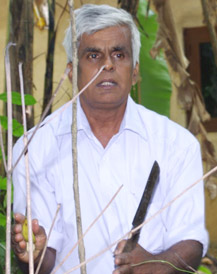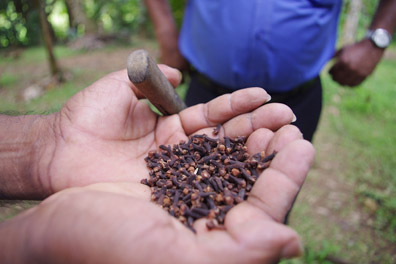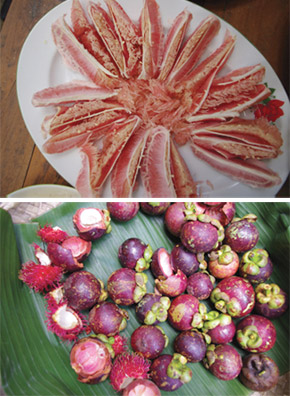|
Climate change in Sri Lanka :
Food security alert!
by Rukshana Rizwie
 |
|
Gamini Dissanayake |
Gamini Dissanayake, 52, tends to his towering nutmeg trees as if they
were growing saplings. He knows all fruit and spices by their scientific
names and would tell you their age. In his quarter acre home garden in
rural Pethiyagoda, Gamini doesn't depend on the daily weather forecast
or temperature measuring tools to tell if the rains would be delayed
this year. He relies on age old wisdom. And, if that fails him, it's
either the sky or the soil.
He uses extracts of Neem leaves as a natural pesticide, and fresh
coconut husks to retain water. In a country which relies heavily on the
use of fertilizers and agro chemicals to increase crop productivity and
ensure food security, it was a relief to find home-gardeners like Gamini
who do things differently.
Home gardening in Sri Lanka have been identified as an integral part
of rural life and culture for centuries and remains today, one of the
major and oldest forms of land use in the country. Home gardens are an
agro-forestry system, which combines both forms of farming - annual and
perennial - within a multi-functional landscape to satisfy household
food requirements, income generation and employment, among other basic
needs.
"Producing enough nutritious food that everyone can access, and doing
so sustainably in the face of severe challenges such as, water scarcity
and climate change, requires multidisciplinary, science-based
approaches. The translation of research knowledge to the most affected
and to those who are drafting polices for the most affected is key,"
Eskil Mattsson, a researcher at the Centre for Environment and
Sustainability, University of Gothenburg, Germany, said, after his tour
of the Kandyan home gardens.
Half of forest cover
Based on research by Agriculture Professor Buddhi Marambe of the
University of Peradeniya, in 2014 alone 14.3% of the total extent of the
country was occupied by home gardens (HG), which extent has continued to
grow at an annual rate of 1.6 %.
 |
|
Cloves |
Sri Lanka presently has a forest cover of 23.5% of which 13.1% is
actually tree planted home gardens. The district with the highest
percentage of HGs is Kandy, 30.4% followed by Kegalle 23.2% and Badulla
17.7%.
National Adaptation Plan
Research has shown that HGs collectively contribute to ensuring food
security in the country. In recognition of this, Sri Lanka's National
Adaptation Plan for Climate Change (NAP) for 2016 - 2025 prepared by the
Climate Change Secretariat of the Ministry of Mahaweli Development and
Environment has prominently featured home gardens. NAP notes, there is a
need to promote the traditional methods of biodiversity conservation for
increased crop resilience, the lessons of which could be learned from
studying HGs. The Plan is to be officially launched by the President in
October this year.
Dissanayake knows the rainfall patterns, the pollen viability and
changes in temperature like the back of his hand. This year he
complained of prolonged dry spells and torrential rains.
"It rained heavily in February, when, actually, the period between
January to March are generally considered as dry spells," he said. "We
no longer get the correct amount of rain at the correct time.
Countering climate change
These erratic patterns will definitely continue," he said, adding
that the changes in rainfall patterns and temperatures are a direct
consequence of climate change.
Prof Marambe said, research indicates a slow and continuous rise of
ambient temperature (an increase of 0.01 to 0.03 Celsius per annum). He
adds, there has been a frequent occurrence of extreme weather patterns
such as droughts, floods, landslides, intense lightning strikes and
tornado type of winds.
As a result, the number of dry days has increased and the number of
cold nights has decreased.
An Asian Development Bank report published in 2009 highlighted that
Sri Lanka, India and Bangladesh were highly exposed, sensitive and
vulnerable to changes in climatic conditions. "A significant component
of the small holdings in the region is represented by home garden
farming systems," he said.
 |
|
Fruits from the home garden |
Academics, researchers and policy makers alike, he says, are
concerned that climate change may have detrimental effects on GHGs.
According to The United Nations Framework Convention on Climate
Change home garden will be able to cushion off the effects of climate
change by increasing crop production during unpredictable or harsh
climatic conditions.
"Food security in rural South Asia and food production in HGs is
intrinsically related and hence, climate change may have significant
implications on food security," said Prof. Gamini Pushpakumara, Dean,
Faculty of Agriculture, Peradeniya University.
The Asia-Pacific Network for Global Change Research, an
intergovernmental organization that promotes policy-oriented research
which spearheaded a project to assess the changes in the composition of
HGs in Sri Lanka under changing climate found that home gardens were not
significantly affected.
The two year project APN funded, titled, Vulnerability of Home Garden
system to climate change and impact on food security in South Asia, done
in collaboration with the Peradeniya University and other stakeholders
in India and Bangladesh, found that home gardeners were highly adaptive
to variable and changing climate.
Some of the specific adaptation strategies used by the home gardeners
in the study sites were, the changing of planting dates, changing
agronomic practices such as fertilization, and pest control, changing
technology such as the use of new varieties/breeds, irrigation and the
optimal use of soil and water conservation measures.
Despite the evidence that climate change has taken place in the past
50 years, the composition of HGs in Sri Lanka, India and Bangladesh has
not changed substantially. The report concluded that home gardens in Sri
Lanka are more climate resilient than those in India and Bangladesh due
to a high diversity.
The HGs were occupied by more nutritional and dense stands of tree
species. In Sri Lanka, Cloves, Nutmeg and Durian are the main income
generator where much of the harvest is usually sold. In Keeriyagaswewa,
the main income generating food tree species was the Tamarind, where 86%
of the total harvest was sold. Dissanayake from Pethiyagoda would profit
around Rs. 35,000 from a single nutmeg tree. Apart from Nutmeg, Avocado,
Jackfruit, Coconut and Durian were sold to markets.
Farmers like Dissanayake, also have paddy fields of their own, which
years ago would reap bountiful harvests, but not anymore. "There came a
time when we were encouraged to use fertilizers and agro chemicals to
increase yield, which we did voluntarily," he said. "However, within a
few years, due to the excessive use of these chemicals we couldn't
plough the fields to the point that it's now in ruins." Most paddy
fields nearby now have to deal with wild boars, issues which even the
government had no pragmatic solution for. Chandrasiri Perera, Provincial
Director of Agriculture, Central Province said, since it was illegal to
kill and sell wild boars, officials were powerless and have advised
farmers to put up fences to keep wild boars at bay.
Fertilizer use
In an attempt to curb the use of such fertilizers and chemicals that
have led to the degradation of paddy fields, the government recently
converted the fertilizer subsidy into cash allowance.
Accordingly, farmers were given a stipend of Rs.25, 000 per annum
which was proportionally increased, depending on the extent of their
fields. The move was meant to curb their dependency on fertilizer
subsidies.
However, Dr Rohan Wijekoon, Director General of Agriculture told the
Sunday Observer, it was not possible to ascertain if farmers had
decreased their fertilizer use.
"We have no mechanism to ascertain that. All we can say is, based on
the last harvest, we believe they may have used the required amounts and
excess." |

